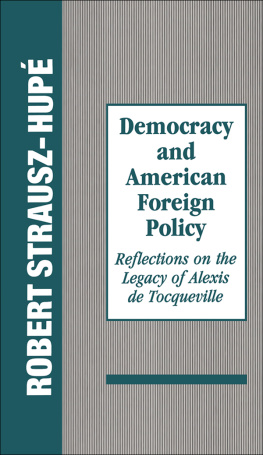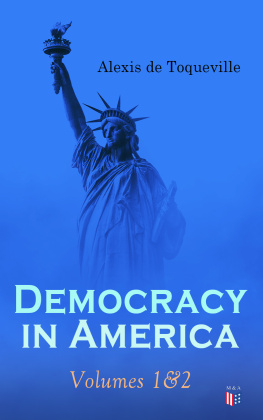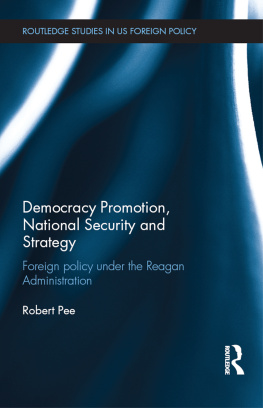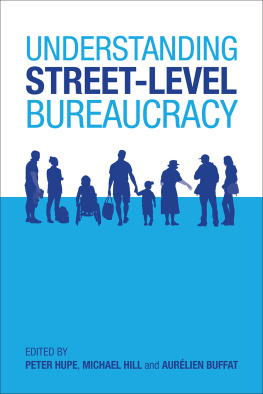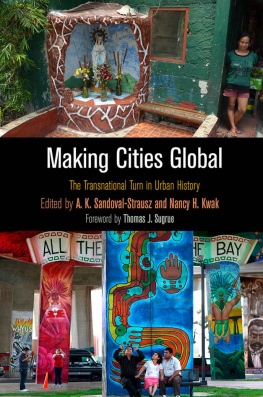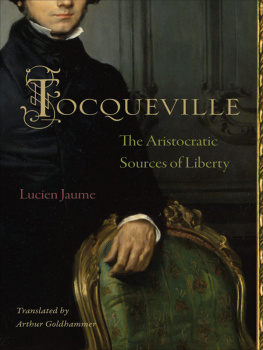Democracy and American Foreign Policy
A Foreign Policy Research Institute Book
This book is part of a series of works sponsored by the
Foreign Policy Research Institute in Philadelphia.
Founded in 1955, the Institute is an independent, nonprofit
organization devoted to research on issues affecting
the interests of the United States.
First published 1995 by Transaction Publishers
Published 2017 by Routledge
2 Park Square, Milton Park, Abingdon, Oxon 0X14 4RN
711 Third Avenue, New York, NY 10017, USA
Routledge is an imprint of the Taylor & Francis Group, an informa business
Copyright 1995 Taylor & Francis.
All rights reserved. No part of this book may be reprinted or reproduced or utilised in any form or by any electronic, mechanical, or other means, now known or hereafter invented, including photocopying and recording, or in any information storage or retrieval system, without permission in writing from the publishers.
Notice:
Product or corporate names may be trademarks or registered trademarks, and are used only for identification and explanation without intent to infringe.
Library of Congress Catalog Number: 94-9585
Library of Congress Cataloging-in-Publication Data
Strausz-Hup, 1903
Democracy and American foreign policy : reflections on the legacy of Alexis de Tocqueville / Robert Strausz-Hup ; with a foreword by Walter A. McDougall
p. cm.
Includes bibliographical references and index.
ISBN 1-56000-175-5 (cloth)
1. United StatesForeign relations1989- Philosophy. 2. Tocqueville, Alexis de, 1805-1859Influence. I. Title.
E840.S78 1994
327.73dc20
94-9585
CIP
ISBN 13: 978-1-56000-175-1 (hbk)
Democratic institutions awaken and foster a passion for equality which they can never satisfy.
In the principle of equality I discern two tendencies: the one leading the mind of every man to untried thoughts; the other prohibiting him from thinking at all.
If ever the free institutions of America are destroyed, that event may be attributed to the unlimited authority of the majority.
Alexis de Tocqueville
Strausz-Hups Foresight
Walter A. McDougall
Marxian analysis has been left behind.... But this does not explain the failure of the Soviet Unionand fail it did.
The Soviets still can veto the making of a new world order; they can no longer create it.
The United States...has not a coherent vision of the future, its own and that of mankind.
The American spirit is that of an open societyopen to all men and all culturesand the political genius of America is the federative idea.
The coming world order will mark the last phase in a[n] historical transition and cap the revolutionary epoch of this century.
The preceding quotations could, could they not, be snippets of presidential speeches, scholarly articles, or op-ed pieces dating from 1989 to 1991? Instead, they appeared in a remarkable article published thirty-five years ago in the premier issue of Orbis. That was when Robert Strausz-Hup, University of Pennsylvania professor and a founding father of that peculiarly American discipline of international relations,
Strausz-Hup, born in Kaiser Franz Josefs Vienna in 1903, has lived a half dozen lives: as a Wall Street broker, freelance writer and lecturer, wartime combatter of Nazi propaganda, professor and intellectual impresario, ambassador, advisor to presidents, and prolific apologist for American policy throughout the cold war. This last role made him a bte noir of the University of Pennsylvanias anti-Vietnam War movement, and his image among subsequent generations of students became that of a hawkish realist who supposedly incriminated his university by association with so-called American militarism. A few earnest activists may have tried to understand Strausz-Hup, for instance by reading his autobiography, In My Time (Norton, 1965). But that seems doubtful: the book has been checked out of the University of Pennsylvania library just five times since 1969. More to the point, young Americans, as Strausz-Hup observed, had a hard time imagining the inhuman nature of totalitarianism, whose abiding threat gave rise to the cold war andrightly or wronglyto the Vietnam War. Hence the ironyand the challengein the fact that, if there was to be a new world order, it was up to the otherwise innocent Americans to will it, design it, and sacrifice to bring it about. It is in the nature of the historical process that the debris of decaying institutions serves as fertilizer for the growth of the future order. But the seeds must be sowed by the United States.
The Era of Revolution
Strausz-Hup named his inaugural Orbis article, The Balance of Tomorrow, after his Ph.D. thesis written in the closing days of World War II,
Nor was Strausz-Hup unique in noting that the twentieth centurys revolutionary swings were magnified and accelerated by science and technology. It was a commonplace of the atomic age that history was speeding up, and that science had outpaced mans ability to manage it and himself. But Strausz-Hup illustrated the point with a startling summary of the reversals of alliances that marked the era of the world wars, reversals that gave the lie to any ideological consistency on the part of the Great Powers, whose principles and practices appear to trip drunkenly over one another (page 12). Only the ingenious services of the mass media, conjuring up an orderliness and rationality where there are none (page 13) had reconciled the American people to their own governments lurches from neutrality to crusade in 1917; from crusade to aloofness, then isolation, after World War I; from isolation to interventionism and allianceeven with the Soviet Unionin 1941; and from cooperation with the Soviets to hostility towards Moscow and alliance with Germany and Japan. Clearly such policies were the products of prudence rather than principle, and if there was meaning in the fantastic storms of the century, it was not in the desperate tacking of stricken ships of state, but in the storm itself, in the process.
The United States and World Federalism
The issue before the United States is the unification of the globe under its leadership within this generation (page 14). Unification of the globe was the only solution to the two threats hanging over humanity: not the USSR (whose collapse Strausz-Hup already foresaw in 1956, while others thought its power cresting), but rather the demographic and political explosion of Asia on the one hand, and nuclear proliferation on the other. The United States had to take the lead in forging a new world order because it was the only power capable of doing so, and because the Americans federative genius suited them to the task. And it had to be done soon, because the survival of the United States, of Western culture, and possibly of mankind depended on it.
This was the necessary outcome of the revolution of the twentieth century. Anarchy could not be allowed to continue, but in a revolutionary era, the old multipolar balance-of-power systemthe nineteenth-century modelcould not be resurrected. It had rested, at least until 1890, on Christian and/or secular liberal values and a self-restraint common to all the European great powers. Those prerequisites no longer existed. Hence the only alternative to global anarchy was unity among the Western powers, and then among all the powers on the face of the globe.

